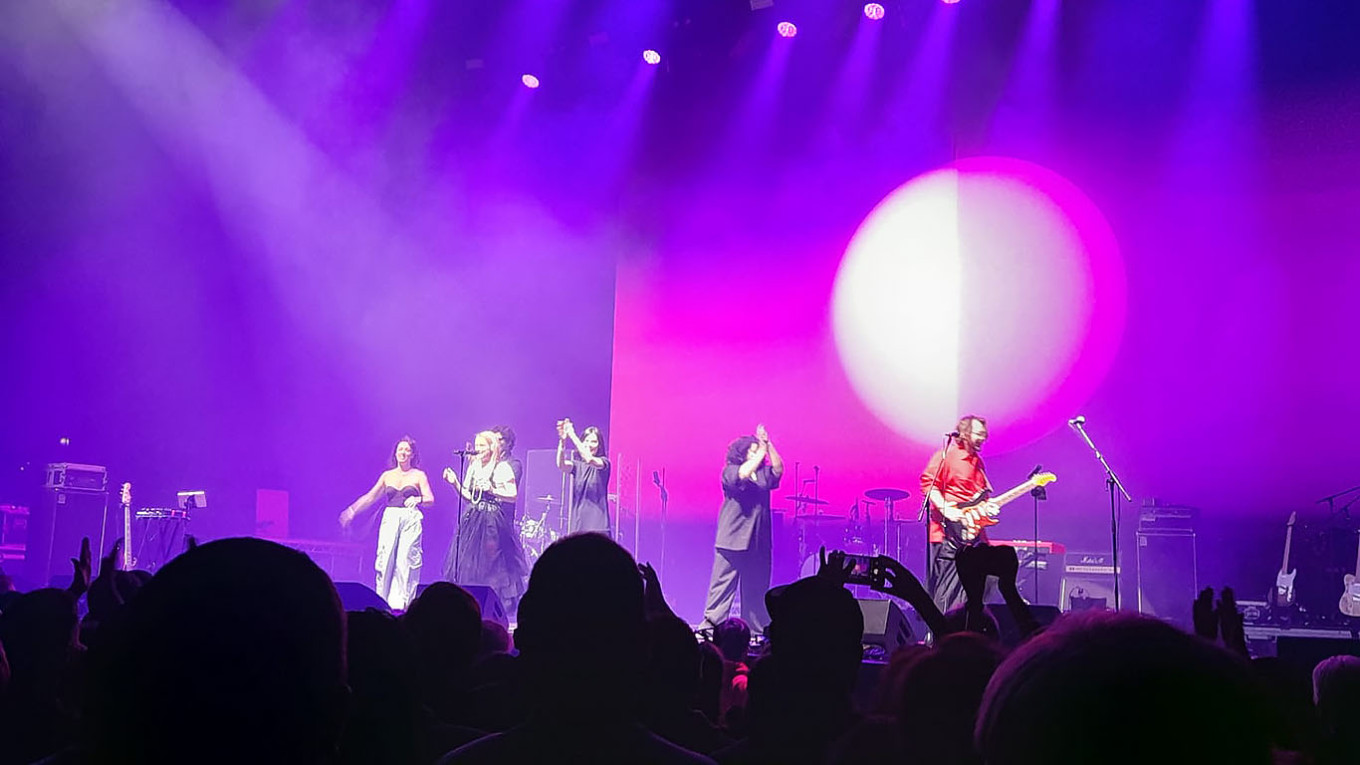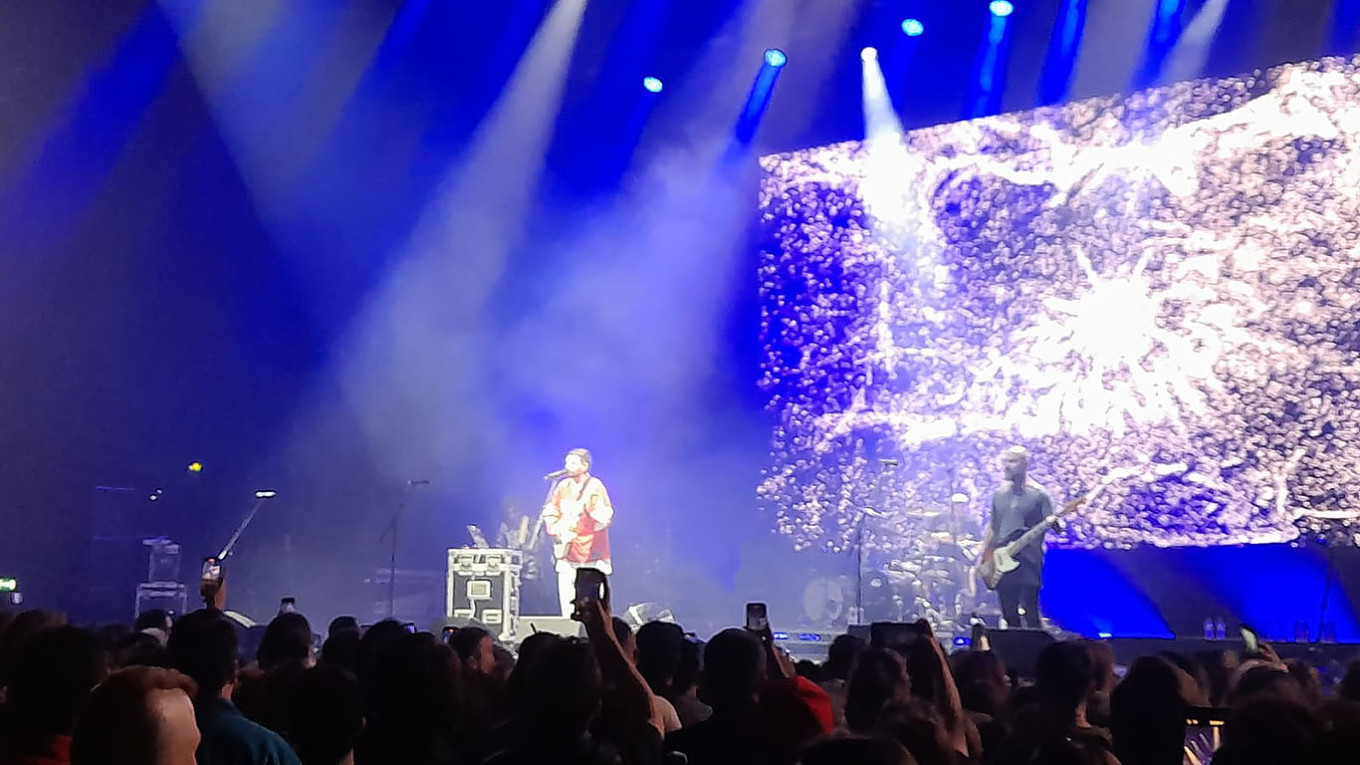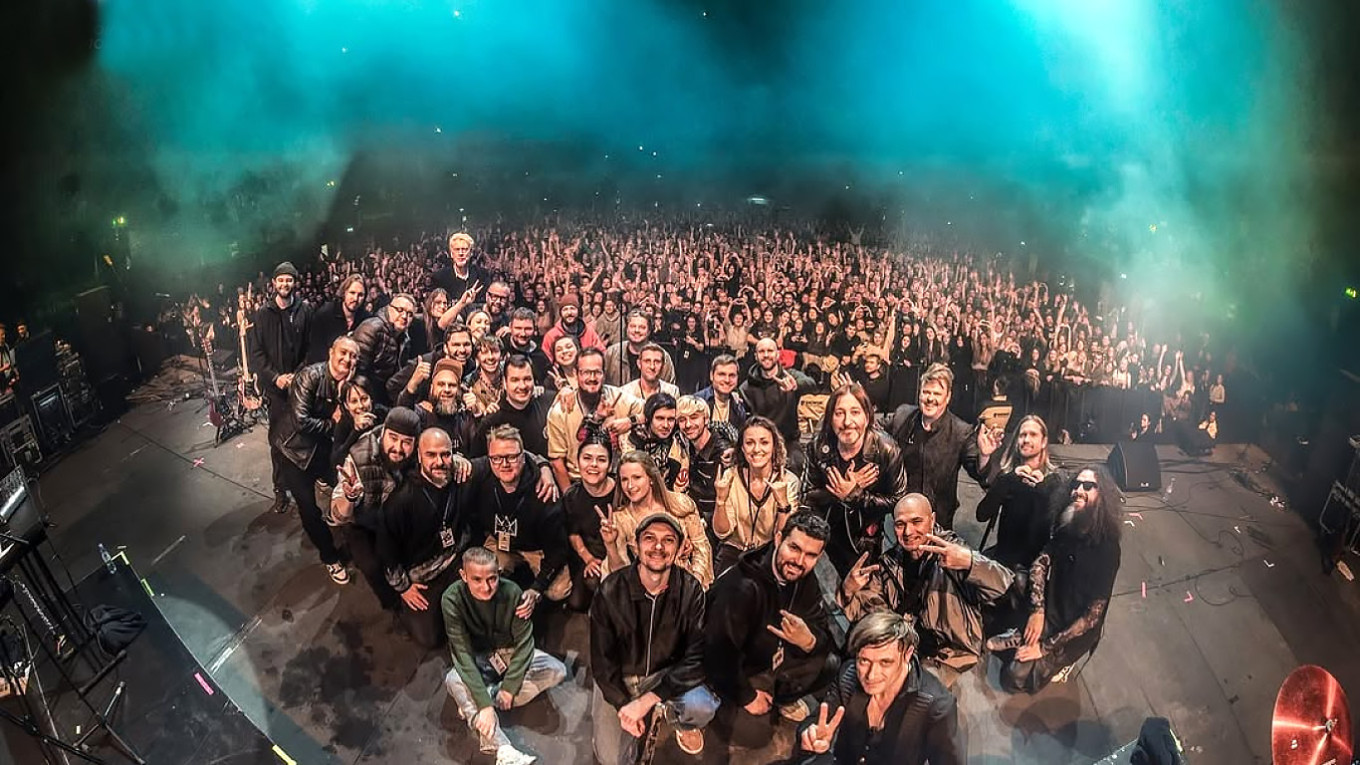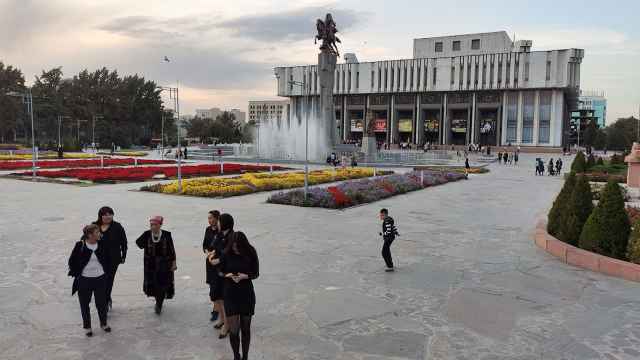Ten thousand Russians packed into London's Wembley Arena lit up their phones and swayed as Soviet rock band Bi-2 sang their hit “No One Writes to the Colonel.” Less than an hour before, hard rockers Pornofilmy slammed their guitars and called on the crowd to chant: “Down with the dictator.”
The show was the first date of the INOI rock festival, an evening of nostalgic and political music from Russian diaspora artists. Titled “Together We Are Stronger,” the festival’s mission is to speak truth to power through art.
“The irony is, the more they try to silence you, the louder the echo grows. To speak or to stay silent? The choice is yours. INOI is a festival for those who refuse to bow to the system, who dare to speak the truth without fear,” the festival’s organizers, who spoke to The Moscow Times on condition of anonymity, said of its mission.
INOI, a play on words from the term inoagent (foreign agent), brings together artists from Russia who have spoken out against the war in Ukraine and have been labeled “foreign agents” by Russian authorities. The lineup ranges from Soviet bands Bi-2 and Boris Grebenshchikov’s BG+ to modern rappers and popstars Noize MC, Kasta, Monetochka and Pornofilmy.
Political by design, the show included a video recording of a song for Ukrainian refugees and statements from all performers condemning Putin’s actions in Ukraine and calling the audience to “dare to be different.”
INOI’s London date brought out a Russian-speaking crowd ranging from grandmothers to students and included conservative and staunchly anti-war individuals alike.
Pop singer Monetochka said INOI aimed to unite as much of the diaspora as possible and promote messages of freedom, creative resistance and the fight for truth.
“Artists are powerful because we have the possibility to gather larger or more diverse crowds than the politicians. People love artists. Very few people love politicians. We should use our platform,” 26-year-old Monetochka told The Moscow Times after her performance.
The festival will next take place in Frankfurt, Germany and Tilburg, Netherlands on Jan. 19 and 20, with additional dates to be confirmed.

Once a superstar in her home country, Monetochka left Russia for Lithuania when the war broke out.
She, like nearly all the performers in INOI’s lineup, has been named a “foreign agent” by the Russian government.
These artists have since been rebuilding their careers abroad, forced to operate at a distance from most of their fan bases.
“It was natural for us to group together for the tour,” said Monetochka. "We're all friends now."
Though it was a political event, INOI also aimed to create a fun concert experience. The slightly subdued London crowd perked up most when they heard hits like Monetochka’s “Every Time,” Pornofilmy’s “I Missed You So Much,” Noize MC’s “Childfree” and “Start a Distraction” and Bi-2’s “My Love.”
To avoid becoming a nostalgia act, each performer mixed old favorites with bold new music created in exile. More recent material was often accompanied by backing visuals of marching soldiers and red lighting, reflecting its darker themes.
Superstar rapper Noize MC played songs from his forthcoming album “Not Everyone Is at Home,” which deals with themes of “forced migration and scrutinizing the past and our roots to see how this happened to us.” The title, Не все дома, is also a play on words to describe someone who is crazy.
Pornofilmy, who has written political songs since 2014, said their work now aimed to translate the painful feelings of isolation and migration. Monetochka described new songs like “It Was in Russia” and ”Self-Harm” as underpinned with “angst and fears about not knowing our future.”
Despite the festival's success in London, many Russian musicians in exile grapple with how to find new fans beyond the Russian diaspora.
While London-based singer Boris Grebenshchikov is now collaborating with British and American artists Dave Stewart of Eurythmics and Stevie Nicks of Fleetwood Mac, the others say they will continue to write and perform in Russian.
For Noize MC, “It’s important not to leave the Russian language and culture to Kremlin power, we have to take it back for ourselves.”
Monetochka, who rocketed to fame in part because of her poetic and subversive lyrics, said she couldn’t imagine achieving a similar depth of expression in a language other than Russian.
Though YouTube and her songs are banned in Russia, Monetochka said she still felt a “moral obligation” toward fans in her homeland and uses TikTok to connect to her listeners, some as young as 10.
“I hope to teach them humanitarian values because nowadays we have terrible school classes in Russia,” she said. “I feel a responsibility not to let them be instrumentalized by political forces.”
For Monetochka and Noize MC, who were both nominated for the Nobel Peace Prize in December by a group of teachers from Oslo, INOI festival is one of many pro-peace projects they have on their plate.
Audience reactions varied. In London, which has a generally older, often wealthier diaspora, some in the crowd had simply come to enjoy the music and were surprised by the political messages.

“I just came to see Bi-2 and didn’t like the agitating chants to bring down Putin,” said Ivan, 45, a Lithuanian-Russian who has lived in the U.K. for nine years. “I believe we don’t know the whole picture of this war and should look at both sides. But the festival did make me think about peace.”
Others, especially the younger crowd, said they felt that all Russian concerts should be political now.
“These artists absolutely should talk about the war and resistance,” said Katya, a journalism student who has lived in Britain for three years. “They are gathering people who wouldn’t be able to form a group independently — this is a great start.”
Zhenya, a 21-year-old IT worker who recently moved to the U.K. on a Global Talent visa, said: “Tonight was amazing. I expected more aggression but it was very calm. There was just the right amount of politics balanced with great music. I felt at home because I felt heard.”
A Message from The Moscow Times:
Dear readers,
We are facing unprecedented challenges. Russia's Prosecutor General's Office has designated The Moscow Times as an "undesirable" organization, criminalizing our work and putting our staff at risk of prosecution. This follows our earlier unjust labeling as a "foreign agent."
These actions are direct attempts to silence independent journalism in Russia. The authorities claim our work "discredits the decisions of the Russian leadership." We see things differently: we strive to provide accurate, unbiased reporting on Russia.
We, the journalists of The Moscow Times, refuse to be silenced. But to continue our work, we need your help.
Your support, no matter how small, makes a world of difference. If you can, please support us monthly starting from just $2. It's quick to set up, and every contribution makes a significant impact.
By supporting The Moscow Times, you're defending open, independent journalism in the face of repression. Thank you for standing with us.
Remind me later.






